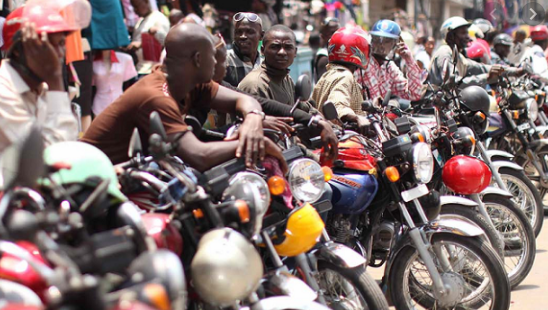Lack of good roads coupled with heavy traffic in most cities had forced a lot of people to look for faster means to transport themselves. What come in handy are okadas (Motorbike) and aboboyaa (Tricycle) as emergency transport service for quicker meet-time and delivery.
With the reckless and lawless behaviour of some okadas and aboboyas riders on the roads of Accra, Kumasi and Takoradi, and even some other towns in Ghana, one is under the impression that they are above the law. They operate as if traffic laws were made for other road users and not them.
I recently visited Bolgatanga, the capital of the Upper East Region, close to the border with Burkina Faso, and to my surprise motorist over there seem to obey traffic regulations and driving over there was fun. No reckless counter-crossing or heavy-handed driving.
In most parts of the capitals, in Ghana, okadas and aboboyaas compete with heavy-duty trucks, high-capacity vehicles on the highways and even on main road lanes.
One major encounter a driver faces daily is the recklessness of these undisciplined motorcycle riders who appear uncontrollable and above the law. They overspeed and even overtake cars/buses on the lanes assigned for them. They flout the laws; in fact, some uniformed security personnel who also ride motorcycles disobey traffic laws.
One immediate set of questions that one may or would come to mind to ask is: Why would one be in a hurry to arrive to a destination at the expense of his/her life; recklessly? What would have been more important for someone to catch up with than the life of one’s self? Why would a passenger seating allow the motorcyclist ride past highways, busy roads or prohibited areas for bikes? It’s quite sad but that’s the reality we face each day.
Should the decision to ban motorcycles and tricycles be revisited?
In December 2020, a debate on the legalisation of okada came up strongly during the run-up to the general elections following a promise by the then Presidential Candidate of the opposition National Democratic Congress (NDC), John Dramani Mahama to allow it and regularise it.
While some criticised him over the idea, saying that it was a populist talk and would cause more harm than good, others defended it, citing the job creation set-ups of the operations.
Also, the Deputy Minister for Transport, Hassan Tampuli, suggested that the law banning commercial motorcycle operations popularly known as ‘okada’ in Ghana ought to be maintained.
According to him, okada riders do not obey road traffic regulations leading to many crashes, hence legalising such a business would be counterproductive.
“Ghana as a country has been with motorbikes for a long time, but it’s the commercialisation of same that I believe is the issue confronting us now. The issue goes beyond okada. I think that generally, motorcycle riders sometimes turn to engage in some amount of rascality on the streets, and most of them don’t respect the road traffic regulations, and sometimes you see two or three people riding on the same bike with no helmets so, in the event of a crash, they don’t have any safety as far as the accident is concerned.”
“Currently, the commercialisation of motorbike is outlawed under the road traffic regulations, and I believe we should continue to maintain it for now until we are able to do a lot more public education about the use of it as a means of transport before we can roll it out.”
Mr. Tampuli made these comments when he appeared before Parliament’s Appointments Committee on Wednesday, June 9, 2021, to be vetted for the Deputy Transport Minister portfolio.
So far, with such verdict raised a time ago, the decision has not gone down well with commuters, and some parliamentarians who feel the decision is elitist and targeted at the poor.
As many sweaty commuters will like or value and prefer motorcycles and tricycles for quick movements other than driving vehicles in our heavy prone traffic areas in Ghana, especially in Accra and Kumasi many are of the view that some substantial needs to be done swiftly.
The people who will support the ban are mostly private cars owners and drivers who often have difficult relationship with the two- and three-wheelers on our roads. Anyone who has driven in Accra, Ashaiman, Kumasi or in any of the cities here in Ghana where okadas and aboboyas operate, will know how frustrating it is to share the same road with them.










